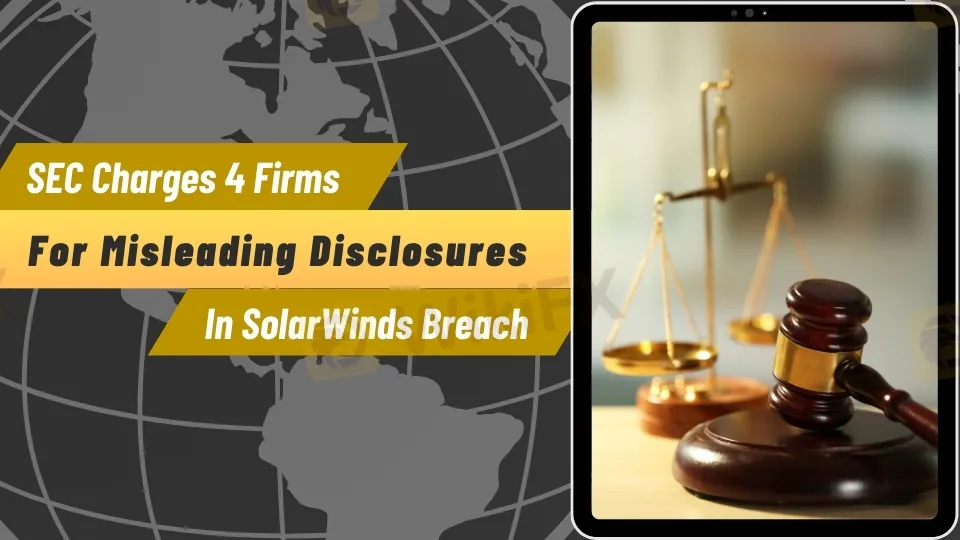简体中文
繁體中文
English
Pусский
日本語
ภาษาไทย
Tiếng Việt
Bahasa Indonesia
Español
हिन्दी
Filippiiniläinen
Français
Deutsch
Português
Türkçe
한국어
العربية
SEC Charges 4 Firms for Misleading Disclosures in SolarWinds Breach
Abstract:SEC charges Unisys, Avaya, Check Point, and Mimecast for misleading disclosures in the 2020 SolarWinds breach. Fines highlight cybersecurity risks and disclosure violations.

The U.S. Securities and Exchange Commission (SEC) has fined four companies—Unisys Corp., Avaya Holdings Corp., Check Point Software Technologies, and Mimecast—for misrepresenting the impact of the 2020 SolarWinds supply chain attack. According to the SEC, these companies misled shareholders and investors about the breachs true extent, marking another chapter in corporate cybersecurity failures.
SEC Fines Companies for Misleading SolarWinds Hack Disclosures
The SECs investigation revealed that these companies failed to disclose the full severity of the SolarWinds hack, which affected thousands of organizations worldwide. Russian state-sponsored hackers had targeted SolarWinds' Orion software, a popular IT management tool, gaining access to many enterprises and government institutions.
The fines, ranging from $990,000 to $4 million, are linked to allegations that the companies downplayed or misrepresented the breach in their public reports. Unisys, for example, was fined $4 million for withholding critical information concerning two SolarWinds-related attacks that resulted in the loss of huge amounts of sensitive data. This was the greatest penalty for violations of their disclosure controls.
Corporate Cybersecurity Failures Highlighted by SEC Investigation
Avaya and Check Point were also criticized for failing to sufficiently warn investors about the dangers of the SolarWinds assault. Avaya first stated that just a small number of emails were viewed, but the SEC discovered that hackers downloaded more than 145 files. Similarly, Check Point, a cybersecurity company, toned down its own breach, giving investors a false feeling of security.
These fines highlight the growing regulatory emphasis on corporate openness in cybersecurity disclosures. The SolarWinds assault, one of the most destructive in recent years, serves as a stark reminder that firms must not only repair breaches but also be transparent with their shareholders.
As cybersecurity events become more common and sophisticated, business executives and compliance officials must improve their reporting mechanisms. With the SEC tightening its regulation of breach reporting, investors and stakeholders are seeking more openness in the aftermath of these big assaults.
The increasing penalties for SolarWinds-related breaches convey a clear message: businesses can no longer afford to conceal cybersecurity flaws or submit deceptive reports.

Disclaimer:
The views in this article only represent the author's personal views, and do not constitute investment advice on this platform. This platform does not guarantee the accuracy, completeness and timeliness of the information in the article, and will not be liable for any loss caused by the use of or reliance on the information in the article.
Read more

The Hidden Checklist: Five Unconventional Steps to Vet Your Broker
Forex broker scams continue to evolve, employing new tactics to appear credible and mislead unsuspecting traders. Identifying these fraudulent schemes requires vigilance and strategies beyond the usual advice. Here are five effective methods to help traders assess the legitimacy of a forex broker and avoid potential pitfalls.

Doo Financial Obtains Licenses in BVI and Cayman Islands
Doo Financial, a subsidiary of Singapore-based Doo Group, has expanded its regulatory footprint by securing new offshore licenses from the British Virgin Islands Financial Services Commission (BVI FSC) and the Cayman Islands Monetary Authority (CIMA).

CFI’s New Initiative Aims to Promote Transparency in Trading
A new programme has been launched by CFI to address the growing need for transparency and awareness in online trading. Named “Trading Transparency+: Empowering Awareness and Clarity in Trading,” the initiative seeks to combat misinformation and equip individuals with resources to evaluate whether trading aligns with their financial goals and circumstances.

Malaysian-Thai Fraud Syndicate Dismantled, Millions in Losses Reported
The Royal Malaysia Police (PDRM) has received 26 reports concerning the Nicshare and CommonApps investment schemes, both linked to a major fraudulent syndicate led by a Malaysian citizen. The syndicate’s activities came to light following the arrest of its leader by Thai authorities on 16 December.
WikiFX Broker
Latest News
AIMS Broker Review
The Hidden Checklist: Five Unconventional Steps to Vet Your Broker
Russia to Fully Ban Crypto Mining in 10 Regions Starting January 1, 2025
YAMARKETS' Jingle Bells Christmas Offer!
Why is there so much exposure against PrimeX Capital?
Doo Financial Expands Regulatory Reach with Offshore Licenses in BVI and Cayman Islands
MTrading’s 2025 "Welcome Bonus" is Here
Doo Financial Obtains Licenses in BVI and Cayman Islands
CFI’s New Initiative Aims to Promote Transparency in Trading
Currency Calculator


